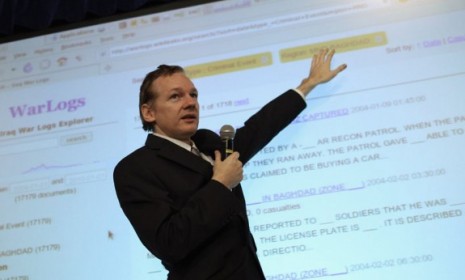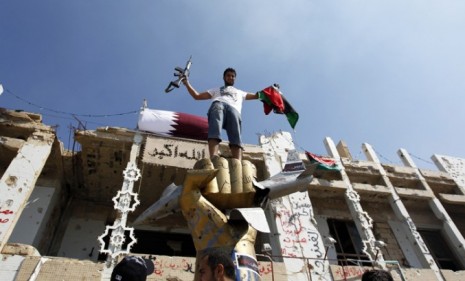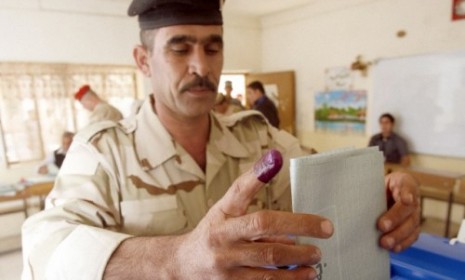The Iraq war logs WikiLeaks dump: 5 revelations
The secrets-sharing site has released its massive dossier on the Iraq War, detailing unreported torture, a secret body count, and a U.S.-Iranian armed skirmish

A free daily email with the biggest news stories of the day – and the best features from TheWeek.com
You are now subscribed
Your newsletter sign-up was successful
The whistleblower site WikiLeaks released an overwhelming 391,832 documents from the U.S. war in Iraq, in the largest-ever leak of U.S. military secrets. Several news organizations — The New York Times, Britain's The Guardian, Germany's Der Spiegel, France's Le Monde, and Qatar-based Al Jazeera — have already spent weeks poring over the documents, all of which are available for browsing at WikiLeaks. (Watch a Russia Today report about the Iraq War dump.) Here are five of the biggest revelations they found:
The U.S. ignored prisoner torture by Iraqis
The "big reveal" from the Iraq war logs, says Marc Ambinder in The Atlantic, are the "incredibly awful reports" of systematic abuse and torture of Iraqi detainees by Iraqi police and security forces, with U.S. knowledge. And "while some abuse cases were investigated by the Americans," says The New York Times, most "seemed to have been ignored, with the equivalent of an institutional shrug." Why? A secret 2004 "fragmentary order" from the Pentagon, "Frago 242," says The Guardian, which instructed U.S. troops to investigate only abuse allegations involving coalition troops. Literally, the only "good news" from WikiLeaks' "latest exercise in radical transparency," says Adrian Chen at Gawker, is that "the logs don't show our own troops torturing anyone."
The Week
Escape your echo chamber. Get the facts behind the news, plus analysis from multiple perspectives.

Sign up for The Week's Free Newsletters
From our morning news briefing to a weekly Good News Newsletter, get the best of The Week delivered directly to your inbox.
From our morning news briefing to a weekly Good News Newsletter, get the best of The Week delivered directly to your inbox.
Iraq had chemical WMDs
Reviving a battle over "the Bush administrations most (in)famous rationale for invading Iraq," says Noah Shachtman in Wired, the WikiLeaks dump revealed that "U.S. troops continued to find chemical weapons labs, encounter insurgent specialists in toxins, and uncover weapons of mass destruction" long after the war started. Mostly, these were remnants of Saddam Hussein's mustard gas from the Iran-Iraq war. Even if Hussein wasn't "stockpiling new WMDs" or trying to build nukes, says Ed Morrissey in Hot Air, this is vindication of Bush's "primary" rationale that Hussein was flouting U.N. no-WMD resolutions. "History will still record that the Bush administration went into Iraq under an erroneous threat assessment" that Hussein was building a stash of WMDs, says Dan Farber at CBS News.
U.S. is keeping track of civilian deaths: 66,000
The U.S. has kept a detailed Iraqi "body count," contrary to repeated public assertions, says The Guardian: 109,032 violent deaths between 2004 and 2009, with 66,081 of those killed civilians. That's "roughly in line" with the casualties tallied "by several sources, including Iraq Body Count" (IBC), says The New York Times. London-based nonprofit IBC says it discovered about 15,000 new civilian deaths in the WikiLeaks war logs so far, bringing its total estimate from 2004-09 to about 106,500 civilian deaths. (IBC counts 12,080 civilian deaths in 2003.)
A free daily email with the biggest news stories of the day – and the best features from TheWeek.com
British blunder let al Qaeda kingpin Zarqawi escape?
Many of those civilian deaths are from sectarian violence stirred up by Abu Musab al-Zarqawi, the top al Qaeda figure in Iraq. In an "astonishing blunder" revealed by the leaks, a lone British helicopter surveilling a car believed to be carrying Zarqawi in March 2005 had to return to base to refuel, says The Guardian. The British troops that rushed in to capture Zarqawi half an hour later came up empty. In the 15 months between that "near-miss" and the U.S. killing of Zarqawi in June 2006, the close Osama Bin Laden associate was able to establish al Qaeda in Iraq throughout the country, and, according to the U.S., mastermind the deadly bombing of the golden-domed al-Askari mosque in Samarra, which sparked a yearlong wave of sectarian revenge killings.
Iran's fingerprints are everywhere in Iraq
Given WikiLeaks' strident anti-war leanings, say Wired's Shachtman and Spencer Ackerman, "it's more than a little ironic" that the Iraq war logs probably "just bolstered one of the Bush administration's most controversial claims about the Iraq war: That Iran supplied many of the Iraq insurgency's deadliest weapons and worked hand-in-glove with some of its most lethal militias." In fact, "perhaps the most startling document" from the massive dump, says Fred Kaplan in Slate, details a September 2007 cross-border firefight between U.S. and Iranian troops: A U.S. patrol killed an Iranian soldier aiming a rocket-propelled grenade launcher at them, then fled under fire. Luckily, "nothing grew out of this skirmish," Kaplan adds, but it shows how much Iran has been part of the war.
-
 The environmental cost of GLP-1s
The environmental cost of GLP-1sThe explainer Producing the drugs is a dirty process
-
 Greenland’s capital becomes ground zero for the country’s diplomatic straits
Greenland’s capital becomes ground zero for the country’s diplomatic straitsIN THE SPOTLIGHT A flurry of new consular activity in Nuuk shows how important Greenland has become to Europeans’ anxiety about American imperialism
-
 ‘This is something that happens all too often’
‘This is something that happens all too often’Instant Opinion Opinion, comment and editorials of the day
-
 3 ways the war in Libya failed
3 ways the war in Libya failedfeature Victory is at hand for Libya's rebels. For NATO, not so much
-
 Did democracy win or lose in Iraq?
Did democracy win or lose in Iraq?feature Iraqis braved the bombs to cast their votes. But is the terror-marred election a step toward stability or chaos?